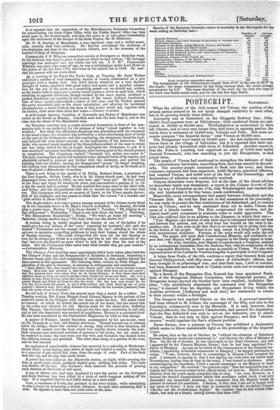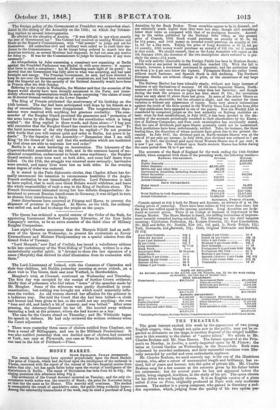POSTSCRIPT. SATURDAY.
When the advices of the 15th instant left Vienna, the position of the several parties seemed to be not much changed relatively to each other, but to be growing hourly more critical. Auersperg was at Inzersdorf, on the Gloggnitz Railway line; Jella- chich's head-quarters were at Schiinbrunn : their combined forces are esti- mated at 36,000 or 38,000 men. Windischgratzw as understood to have left Olmiitz, and to have sent troops from that town in separate parties: his whole force is estimated at 10,000 men, Tchechs and Poles. But some ac- counts compute " the Imperial forces " near Vienna at 98,000 men. The Hungarians were stated at 50,000 men: the last authentic account leaves them at the village of Schwacha; but it is reported that their out- posts had already skirmished with those of Jellachich. Another report is, that the Poles in Lemberg had organized an army of 8,000 men under General Dwernecki, who was marching to join the Hungarians, or had joined them. The people of Vienna had continued to strengthen the defences of their city: extraordinary barricades, resembling forts, had been erected in the sub- urbs. The country-people continued to flock into the town, and three volunteer regiments had been organized; 3,000 Styrians, practised riflemen, had reached Vienna, and 6,000 were at the foot of the Semmering; and, declarations of adhesion were continually received.
Outpost skirmishes were frequent, but at the date of the direct advicea no immediate battle was threatened: a report in the Cologne Gazette of the 19th, by way of Frankfort on the 17th, that Windischgriitz had reached the city and bombarded it for four hours, needs confirmation.
Meanwhile, more correspondence had passed between Jellachich and the Viennese Diet He told the Diet not to feel uneasiness at his proximity: he was ready to protect the free institutions of his fatherland, and to restore order in Vienna; and he only cautioned them not to make Vienna the scene of a bloody contest. The Diet reciprocated his caution, and de- clared itself quite competent to maintain order or resist aggression. The- Diet also referred him to an address to the Emperor, in which they say-
" Your Majesty—An interval of only three days is interposed between our first and between this address, and yet every hour has hurried on the state to im- pending ruin. It has come so far that there is no remedy but in giving their due to the wishes of the people. There is no help except in a Congress of nations, with international mediators. Victories of the army would only make the evil worse. The people still trust their Constitutional Monarch, and confidently ex- pect that your Majesty will prefer a peace congress to the bloody appeal to arms. . . . . We wish, therefore, your Majesty to convoke such a Congress assisted. by an international committee from the Austrian Diet, with the cooperation of the- two responsible Ministries, to meet as soon as possible at Vienna. We also wish- representatives of the Lombardo-Venetian kingdom to participate in that Congress.,
A letter from Pesth, of the 8th, confirms a report that General Roth and General Philippowich, with fifty-seven others of Jellachich's officers, had been brought in as prisonere,of war; and that their men, 7,450 in number, had been disarmed and sent back to Croatia under oath not to resume arms against Hungary. By a decree of the Hungarian Diet, Kossuth has been appointed Presi- dent of the Hungarian Defence Committee, with dictatorial powers; all Hungarian troops beyond the frontier have been recalled; Archduke Ste- phen, "who perfidiously abandoned the command over the Hungarian army," is deposed from his dignities; and Hungarians living within the Austrian provinces [Bathyany and such men] are summoned to return to their country within a fortnight.
The Emperor had reached Olmiitz on the 14th. A personal interview had been refused to M. Llihner, the messenger of the Diet, and also to the deputation subsequently sent to the Monarch. It is said, however, that Prince:Lobkowitz, the Emperor's Chamberlain, had assured the deputation, that the Ban Jellachich was only to act on the defensive, not to attack Vienna; that he was only to fight against Hungary; and that " circum- stances " would regulate the Ban's ultimate position.
Baron Recsey, now a prisoner at Vienna, has published a declaration which seems to throw considerable light on the proceedings of the Imperial Court.
He states, that on the 1st of October, he "refused the situation of Esterhazy because Bathyany would not countersign it," and likewise the office of Minister of War. On the 3e1 of October, he was summoned to the State Chancery, and told [apparently by the Finance Minister, Kraus] that he had been appointed Pre- sident of Hungary. As soon as he heard of the consequences of the Imperial ma- nifesto, [appointing Jellachich commander in Hungary,] he begged permission to resign. "1 was, however, forced to countersign it, because I had accepted the post. I declared, in signing it, that I was signing my exile from my native land. Nevertheless, having been so long in the army, I was inured to obedience. After countersigning the manifesto, I sent a special messenger to his Majesty to hand in my resignation." He received "the gracious reply" that his resignation was ac- cepted, but that he must attend to his official duties ad interim. Habits of subor- dination from his youth again compelled him to obey. "As soon, however, as I learned the decided disapprobation which this manifesto called forth, I not only demanded my immediate dismissal, but requested that his Majesty would be pleased ter rescind the manifesto. I declare, in fine, that I am not in league with any party at Court: I have not been in connexion with the Archduke Francis Charks nor the Archdutchess Sophia." Be explains that ha had visited Jells- cinch, but only as a friend; having known him since 1827. The foreign policy of the Government at Frankfort wee somewhat eluci- dated in the sitting of the Assembly on the 16th; on which day Selmer- ling replied to several interrogatories.
He alluded to the situation of Austria. "It was difficult to say where exactly the seat of Government lay." The Cabinet had resolved on sending Welcker and Mosle as the Regent's Commissioners, with "full powers" to judge and act for themselves. All authorities civil and military were called on to yield their obe- dience to the Commissioners. "As for troops being ordered to march into the Austrian territory, as several Members had supposed, he had not seen any motive for doing so. It was for the Commissioners to judge for themselves if any were necessary."
An interpellation by Jahn concerning a conspiracy now organizing at Berlin against the Frankfort Parliament was alluded to with some reserve: it appears that there is such a conspiracy; but M. Schmerling made light of its power: he showed that the Government was fully alive to what was occurring, and had used foresight and energy. The Prussian Government, he said, had been directed to keep its eye over the threatened congress of conspirators, and had been reminded that the Imperial act for the security of the National Assembly would have force in Prussia after the 30th October.
Referring to the events in Wallachia, the Minister said that the accession of the Regent would shortly have been formally annotinced to the Porte, and imme- diately afterwards representations would be made concerning "the claims of many an ill-treated German resident on the Lower Danube."
The King of Prussia celebrated the anniversary of his birthday on the 15th instant. The day.had been anticipated with hope by his friends as a day of reconciliation: they were disappointed. The congratulatory depu- tations were received with anything but gracious cordiality. The com- mander of the Burgher Guard promised the guarantee and "protection of the arms borne by the Burgher Guard for the constitution which is being settled ": the King replied in these words, and these alone—" I beg you will remember that the Burgher Guard has received its arms from me." To the loyal assurantes of the city deputies he replied—" Do not promise with words that you will restore quiet and order in Berlin, but prove it by deeds." To the deputies of the Assembly—" Remember that I am still King 'by the Grace of God,' and that the authorities which are instituted by God alone are able to maintain law and order."
Berlin is in a state bordering on insurrection. The labourers of the COpermickerfeld assembled on the 16th, and in the common hatred of me- chanical competition, endeavoured to break some machinery; the Burgher Guard resisted; arms were used on both sides, and some half dozen were killed. On the 17th, the struggle was renewed more seriously; barricades were erected, and many lives were lost on both sides. In the evening some degree of order was restored.
It is stated in the Paris diplomatic circles, that Charles Albert has for- mally announced his intention to recommence hostilities if the Anglo- French mediation be not immediately effective. Lord Palmerston is said to have replied, that in such case Great Britain would withdraw, and leave the whole responsibility of such a step to the King of Sardinia alone. The French Government intimated strong but less definite disapprobation: de- termined to prevent Russian interference in Germany, it was obliged in turn to abstain from interference in Italy. Some disturbances have occurred at Ficamp and Havre, to prevent the shipment of potatoes to England. At Havre, on the 19th, the military was called out, and had to charge the people on the quays.



























 Previous page
Previous page